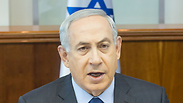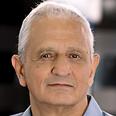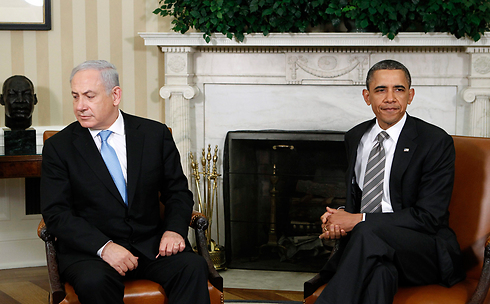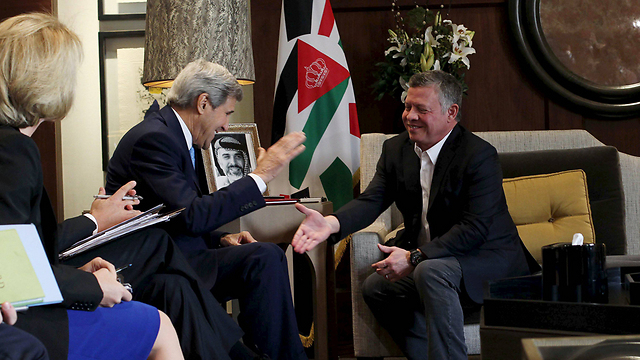Prime Minister Benjamin Netanyahu departed for Washington on Sunday afternoon, and is set to meet with President Barack Obama at the White House on Monday. It will most likely be a business-like meeting: Obama will likely pay off the debt of promises he made to Democratic senators in exchange for their votes to approve the Iran deal; this debt includes advanced military equipment for Israel, and maybe even some funds. But nothing more – no defense pacts, no guarantees.
Netanyahu held up his end of the deal: He promised the White House that his speech against the Iran deal at the UN General Assembly meeting would be his last on the matter; and he has kept his word. The threats to urge Republicans in Congress to enact new sanctions have all but disappeared, as if they were never uttered.
Netanyahu is convinced that Obama is a disaster for America, and an enemy of Israel; Obama is convinced that Netanyahu is a pathological liar, and a disaster for Israel. Nothing they will say in public will change that reality.
In a meeting between leaders, after the cameras have been shooed out of the room, a sense of intimacy normally takes hold. Most politicians have similar domestic problems: They can vent about them to each other. They can maintain eye contact. President Bush once said that he learned the nature of a leader by looking into their eyes. He looked into Putin's eyes and believed him. There is no chance that Obama will experience this sense of intimacy in his meeting with Netanyahu. Regardless, they have things to discuss.
At the height of the clashes on the Temple Mount, Netanyahu agreed that Jordan would be responsible for security cameras that will be placed at every corner of the Temple Mount. The government of Jordan's announcement of the deal was supposed to make Amman appear as an active party in all happenings in the West Bank, while beating back domestic criticism over its peace with Israel.
Right wing officials in Israel protested Netanyahu's compromise. Why would Israel agree to weaken its hold on the Temple Mount? It would be a surrender to the forces of terror. Why Jordan? Netanyahu reneged.
The king was then seen as a liar and collaborator. The anger was great. Under pressure, Netanyahu backtracked on rejecting the deal. Now he is ready to approve the deal, while leaving the details up for negotiation, hoping that the issue will be all but forgotten by the time the negotiations convene. He would be all too happy to have Obama or Kerry mend his ties with Abdullah.
The two could discuss the Palestinian issue. Obama will say that he whole-heartedly supports Israel's right to defend itself, but asks himself what will happen the day after. Does Israel have anything to offer? Netanyahu will talk about terrorism, incitement, and Abbas' inciting speeches. In light of that, he will say that he is ready to renew peace talks without preconditions, anywhere, even tomorrow. Obama will smile: He has already heard this speech time and again. He is convinced that Netanyahu's version of negotiations only serves the purpose of playing for time.
Obama will then say that Kerry had convinced Abbas to hold off on any diplomatic steps until Netanyahu's visit to Washington. What can Kerry say to him now?
Netanyahu will repeat his tired speech. Negotiations, at any time, even tomorrow. "I even froze settlement construction," he will add. "Sadly, that’s just not enough anymore," Obama will say.
"Will the US veto the resolution that New Zealand plans to put to a vote at the Security Souncil?" Netanyahu will ask. Any resolution that talks about 1967 borders will complicate the situation.
It's doubtful that Obama will commit to anything. He would prefer to let Netanyahu sweat a bit.
"What do you think about the state of the Palestinian Authority?" Obama will ask. If they still had any trust between them, Netanyahu would tell Obama that officials within the Israeli defense establishment have grown frustrated with the Authority, and place their trust on Hamas. Hamas is popular today, both in the West Bank and Gaza. The Palestinian Authority is seen as a weakened and corrupt actor, which does not care for the good of the Palestinian people. The future belongs to Hamas. All the better that Hamas is less effective against Israel within the international organizations. Netanyahu will almost surely be content with raising objections to Abbas' speech.
They could talk about Syria and Hezbollah, or ISIS. They will talk, but they won't really say anything. "It was a good meeting," the White House spokesman will say to the media. "The two discussed all the issues on the agenda." "Excellent meeting," Netanyahu will say.




















